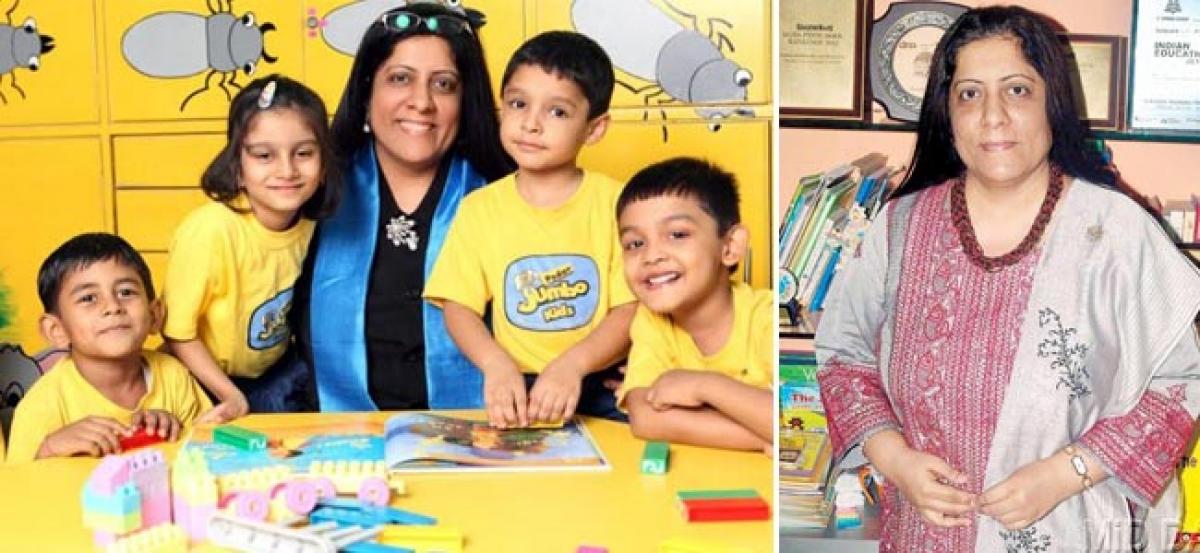Live
- PM Modi highlights govt's efforts to make Odisha prosperous and one of the fastest-growing states
- Hezbollah fires 200 rockets at northern, central Israel, injuring eight
- Allu Arjun's Family Appearance on Unstoppable with NBK Breaks Viewership Records
- Unity of hearts & minds essential for peace & progress, says J&K Lt Governor
- IPL 2025 Auction: I deserve Rs 18 cr price, says Chahal on being acquired by Punjab Kings
- EAM Jaishankar inaugurates new premises of Indian embassy in Rome
- Sailing vessel INSV Tarini embarks on second leg of expedition to New Zealand
- Over 15,000 people affected by rain-related disasters in Sri Lanka
- IPL 2025 Auction: RCB acquire Hazlewood for Rs 12.50 cr; Gujarat Titans bag Prasidh Krishna at Rs 9.5 crore
- Maharashtra result reflects the outcome of Congress' destructive politics: BJP's Shazia Ilmi
Just In
Parents make some common mistakes which hinders the natural development process of the infant: Born Smart


Pregnant mothers tend to read up a lot. From how to deal with pregnancy, to what to feed your child, their possible sleeping patterns, activities etc;
Pregnant mothers tend to read up a lot. From how to deal with pregnancy, to what to feed your child, their possible sleeping patterns, activities etc;
But a crucial fact that is ignored during the nine months of pregnancy by parents is to understand the how child’s psycho-social, emotional, cognitive and language development really happens.
Developmental psychologists all over the world have found similar patterns in the development of a child. For instance, where emotional expressions are concerned, here are some of the expressions found in the early months of a child-
Birth: Interest, disgust and distress
2-3 months: social smile.
3-4 months: anger, surprise, sadness etc;
Swati Popat Vats, stellar educationist and founder of the Born Smart parent-toddler program offers parents an insight and understanding into how a baby’s brain develops and what can parents do to help nurture their baby’s social, emotional, language, physical and cognitive development in small five minute games and play interactions from birth to 36 months. She warns us about these common mistakes.
1. Dependence on aayah/babysitter: It is alright to take help from an outsider. But a child also forms a close bond with them if they are constantly involved in their daily routine. It is essential for a parent to get involved in small activities with their children. For instance, a Born Smart video explains how to introduce the concept of light and dark to the child. The baby and the mother are alone in a room where the mother flashes the torch at various points in the room. The baby is fascinated by this and attempts to catch hold of the light. It is only after some time that the child realises that the light cannot be caught. Such small activities enhances the development of the child as well as forms a strong bond between the baby and the parent.
2. Interfering in play with toys: Parents usually guide their children to play with toys in a certain way. But it is important that the child learns this on their own. Research has proven that 90% of the brain develops in the first three years of life. So your child is smart enough to learn how to play with it on their own. The child may touch the toy, feel it and even taste it. But eventually they will discover how it works.
3. Restricting the child's movement: Most infants between the age of 6-14 months are able to perceive depth. This has been proved by the Visual Cliff Experiment by Eleanor Gibson and Richard Walk. It is important that parents do not restrict their children from crawling to one particular spot to another. Let the child explore their environment on their own. The Gibson and Walk research has also proven that an infant's perception of danger is directly proportional to the expression of the caregiver. For instance, if the caregiver is happy and encourages the child to get off the bed (for example) then the child will do so, but on the contrary if the caregiver expresses anger or sadness then most infants do not take the leap.
4. Not saying good-bye to your child: Most of us have experienced this situation as kids: when a child is engrossed in an activity and is not looking for their parents, the parents go away without informing the child. Later when the child realises their parent has left them they cry their eyes out. This is not a healthy practice and it has long-term effects on the psychological development of the child. Such action induces copious amounts of stress in the child, they do not trust their caregiver and eventually live in constant that their parents will leave them again. Hence, it is important that parents say goodbye to their child before leaving or explain them that they are leaving but will be back soon. If they feel that their child is expressing negative emotions then parents should wait for sometime and use another technique.
5. Overanxiety: There are innumerous books and there are many acquaintances who will give you endless suggestions about child development. But you know your child best and it is best to go with your instinct.
These are only some points that parents should keep in mind. Many more have been highlighted along with visual aids on the Born Smart website http://www.born-smart.com/

© 2024 Hyderabad Media House Limited/The Hans India. All rights reserved. Powered by hocalwire.com






